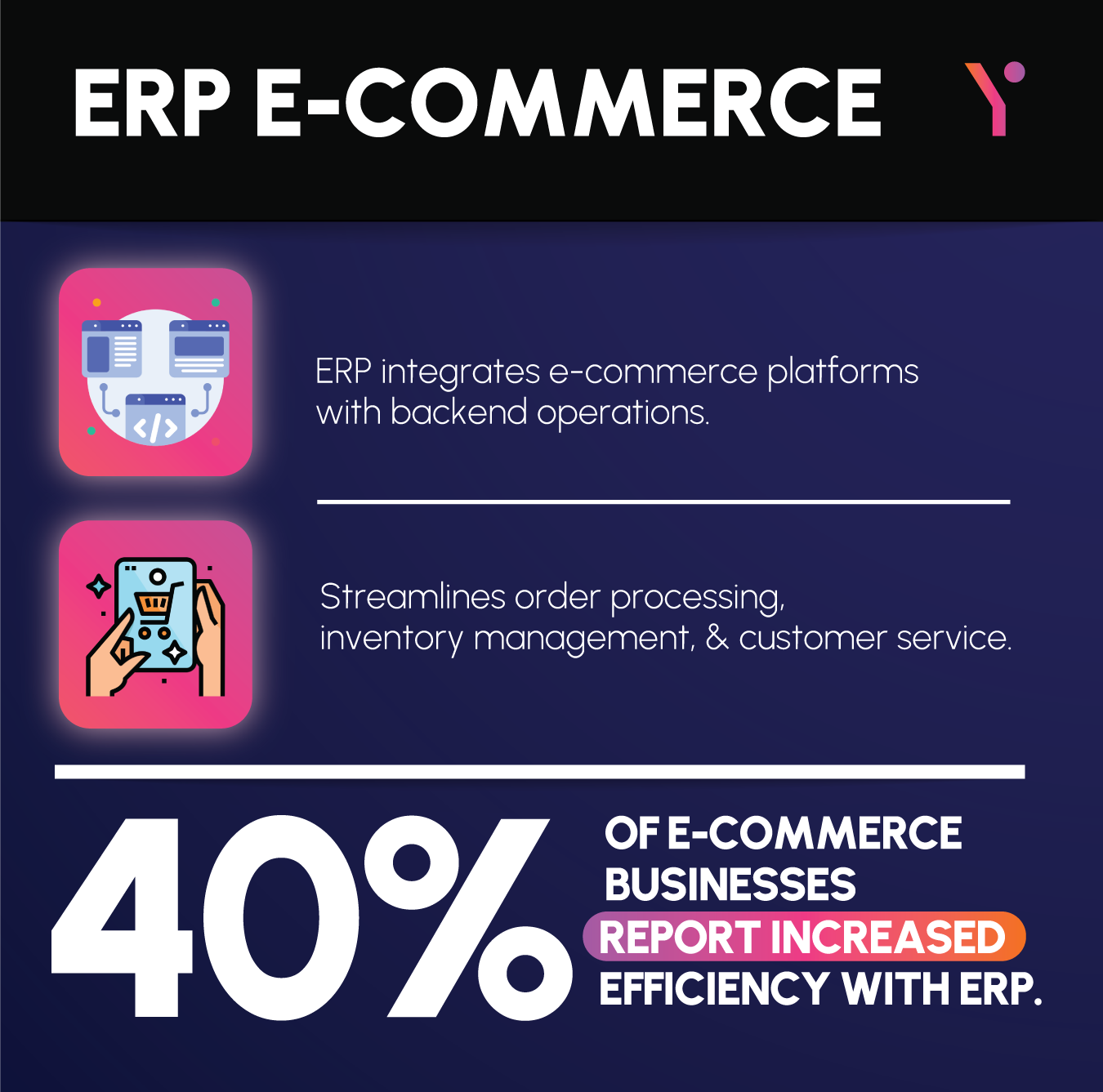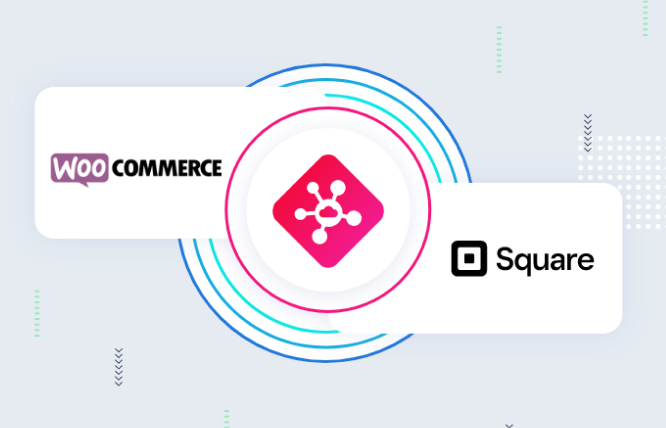Introduction
ERP systems are a great way to help your business boost efficiency. With the rise in e-commerce, businesses are looking at ways ERP can be leveraged to improve their operations. This article will discuss the benefits, challenges and steps towards ERP integration.
The e-commerce industry is growing at a steady pace, and with more consumers feeling comfortable buying online, this market is set to see a larger demand in the coming years. The e-commerce market is set to reach $6.3 trillion by the end of 2024, growing annually at 8.8%. This shows that the e-commerce market is showing no sign of slowing down, but as the market grows, how does a business owner ensure that their operations are streamlined? This is where ERP e-commerce comes into play.
In this article, we will discuss what ERP e-commerce is, the challenges your business could face when implementing ERP and the benefits of implementing ERP to ensure smooth and efficient operations.

What is ERP E-Commerce?
Enterprise Resource Planning (ERP) systems are critical for managing and integrating core business processes. When applied to e-commerce, ERPs provide comprehensive solutions that streamline operations, improve efficiency, and enhance customer experience. Integrating an ERP system with an e-commerce platform can revolutionise how businesses operate by automating and synchronising various functions such as inventory management, order processing, customer relationship management (CRM), and accounting.
Key Benefits of ERP for E-Commerce
ERP systems allow businesses to streamline their processes in various industries, and e-commerce is no different. With the rise of microservices design and development, e-commerce businesses have seen a substantial improvement in processes.
With the help of ERP for e-commerce, businesses can enjoy the following benefits:
Streamlined Operations
An ERP system integrates all aspects of an e-commerce business, from inventory management to order fulfilment. This integration eliminates data silos, ensuring real-time data accuracy and consistency across all departments. With streamlined operations, businesses can reduce manual errors, accelerate order processing times, and improve overall efficiency.
Enhanced Inventory Management
ERP systems provide robust inventory management capabilities, allowing e-commerce businesses to track inventory levels in real-time. This ensures accurate stock information, preventing overselling and stockouts. Automated inventory management helps in maintaining optimal stock levels, reducing carrying costs, and improving cash flow.
Improved Customer Experience
By integrating ERP with e-commerce, businesses can offer a seamless and personalised shopping experience. Real-time data synchronisation ensures accurate product availability information, timely order updates, and efficient customer service. Enhanced CRM features within the ERP system enable businesses to better understand customer preferences and tailor their marketing efforts accordingly.
Efficient Order Management
ERP systems streamline the entire order management process, from order entry to delivery. Automation of order processing reduces the risk of errors, speeds up order fulfilment, and enhances customer satisfaction. The system can also handle complex order scenarios, such as bulk orders, returns, and refunds, with ease.
Financial Integration & Reporting
Integrating an ERP system with an e-commerce platform consolidates financial data, providing a comprehensive view of the business’s financial health. Automated accounting processes reduce the risk of errors and ensure compliance with financial regulations. Real-time financial reporting and analytics help businesses make informed decisions and plan for growth.
Scalability & Flexibility
ERP systems are designed to scale with business growth. As an e-commerce business expands, the ERP system can accommodate increased transaction volumes, additional sales channels, and new market territories. The flexibility of ERP solutions allows businesses to customise features and functionalities to meet their specific needs.
Data-Driven Insights
ERP systems offer advanced analytics and reporting tools that provide valuable insights into business performance. E-commerce businesses can leverage these insights to identify trends, optimise operations, and develop strategic initiatives. Data-driven decision-making helps in enhancing operational efficiency and driving business growth.
Challenges of Implementing ERP for E-Commerce
While there are several benefits associated with the integration of ERP to your e-commerce platform, this comes with several challenges. Let’s discuss these challenges and what business owners can expect when implementing an e-commerce or manufacturing ERP.
Complex Integration Process
Integrating an ERP system with an existing e-commerce platform can be complex and time-consuming. It requires careful planning, skilled resources, and a thorough understanding of both systems. Businesses must ensure seamless data flow between the ERP and e-commerce systems to avoid disruptions.
High Implementation Costs
Implementing an ERP system involves significant investment in terms of software, hardware, and human resources. Small and medium-sized e-commerce businesses may find the initial costs high. However, the long-term benefits and ROI often outweigh the initial expenditure.
Change Management
Transitioning to an ERP system requires a cultural shift within the organisation. Employees need to adapt to new processes and workflows. Comprehensive training and support are essential to ensure a smooth transition and maximise the benefits of the ERP system.
Steps to Integrate ERP to E-Commerce
Once you have weighed the challenges and benefits, the next step is how to integrate ERP to your e-commerce platform. Following are the steps you can take and the things you need to take into consideration when implementing your ERP system to your e-commerce platform.
Assess Business Needs & Goals
The first step in integrating an ERP system with your e-commerce platform is to assess your business needs and goals. Start by evaluating the requirements of your business, such as inventory management, order processing, and customer relationship management. It is crucial to define clear objectives for the integration, whether it’s improving operational efficiency, enhancing the customer experience, or scaling your operations. This initial assessment will provide a roadmap for the integration process and ensure that the ERP system chosen aligns with your business goals.
Choose the Right ERP System
Once you have a clear understanding of your business needs, the next step is to choose the right ERP system. Research various ERP solutions that are compatible with your e-commerce platform and meet your requirements. Consider the features offered by different ERP systems and their scalability to ensure they can grow with your business. Selecting the right ERP system is vital as it forms the backbone of your integrated solution and will significantly impact the efficiency of your operations.
Plan the Integration Process
Planning the integration process is essential for a smooth transition. Develop a detailed project plan outlining the integration steps, timelines, and resource allocation. Identify key stakeholders from different departments, including IT, sales, and finance, to ensure their involvement and buy-in. A well-thought-out plan will help in coordinating efforts across the organisation and addressing potential challenges proactively.
Data Mapping & Migration
Data mapping and migration are critical steps in the integration process. Begin by identifying and mapping the data fields that need to be synchronised between the ERP and e-commerce systems. This ensures that the data flows seamlessly between both systems. Conduct data cleansing and standardisation to maintain accuracy and consistency during migration. Carefully transfer data from your e-commerce platform to the ERP system, ensuring that all relevant information is accurately migrated. Proper data management is crucial to avoid discrepancies and maintain data integrity.
Configure & Customise the ERP System
After migrating the data, configure and customise the ERP system to meet your business needs. Set up the necessary ERP modules, such as inventory, order management, and accounting, to align with your operations. Customise workflows within the ERP system to match your existing business processes and e-commerce operations. Tailoring the ERP system to your specific requirements ensures that it enhances efficiency and supports your unique business model.
Implement Integration Middleware
Integration middleware plays a vital role in facilitating seamless data exchange between the ERP and e-commerce systems. Select an appropriate middleware solution that automates data synchronisation and ensures real-time updates between the systems. Configure the middleware to handle data integration tasks, such as order updates and inventory adjustments, efficiently. This step is crucial to maintain data consistency and enable smooth operations across the integrated platforms.
Test the Integration
Thorough testing is essential to ensure the integrated system functions correctly. Conduct comprehensive tests to identify and resolve any issues before going live. Simulate real-life scenarios, such as order placement, inventory updates, and customer information changes, to verify the integration’s performance. Address any problems that arise during testing to ensure the integrated system operates smoothly and meets your business requirements.
Train Employees
Training employees on the new integrated system is crucial for successful implementation. Provide comprehensive training sessions to familiarise them with the functionalities of the ERP system and the e-commerce platform. Offer ongoing support and resources to help employees adapt to the new system and address any questions or concerns they may have. Well-trained employees will be more confident in using the integrated system, leading to improved efficiency and productivity.
Go Live & Monitor
Once the system has been thoroughly tested and employees are trained, it’s time to go live with the integrated ERP and e-commerce system. Roll out the system across the organisation and continuously monitor its performance. Regularly check for any issues and make necessary adjustments to ensure the system meets your business objectives. Monitoring the system’s performance helps in identifying areas for improvement and ensures smooth operations.
Evaluate & Optimise
After the integration is live, it is essential to evaluate and optimise the system continuously. Collect feedback from employees and customers to identify any areas that need improvement. Use this feedback to refine and optimise processes, enhancing efficiency and addressing emerging business needs. Continuous evaluation and optimisation ensure that the integrated system remains effective and supports your business goals as it evolves.
Conclusion
Incorporating ERP systems in any business process can streamline operations and promote efficiency. This is also the case with e-commerce platforms which can leverage ERP systems to improve the effectiveness of your online store. If you are looking for an ERP software development company, you are in the right place. Contact FuturByte and schedule a free consultation with our team. We would love to understand your business requirements and plan a custom ERP solution for you.
Frequently Asked Questions
When selecting an ERP system for e-commerce, look for features such as inventory and order management, customer relationship management (CRM), accounting and financial management, reporting and analytics, integration capabilities with e-commerce platforms, and scalability to accommodate business growth.
Most ERP systems offer integration capabilities with popular e-commerce platforms such as Shopify, Magento, WooCommerce, and BigCommerce. However, it is essential to verify the compatibility of the ERP system with your specific e-commerce platform to ensure seamless integration.
The implementation timeline for an ERP system varies depending on the complexity of the business processes, the size of the organisation, and the level of customisation required. On average, it can take anywhere from a few months to over a year to fully implement an ERP system.
The costs of ERP integration for e-commerce include software licensing fees, implementation and customisation costs, training expenses, and ongoing maintenance and support fees. The total cost varies based on the ERP system chosen, the complexity of the integration, and the size of the business.
ERP systems provide real-time visibility into inventory levels, automate stock updates, and enable accurate demand forecasting. This helps e-commerce businesses maintain optimal inventory levels, reduce stockouts and overstock situations, and improve order fulfilment efficiency.
Yes, many ERP systems are designed to manage multi-channel sales by integrating with various sales channels, including online stores, marketplaces, and physical retail locations. This centralised approach ensures consistent data across all channels and streamlines order processing and inventory management.
Have questions or feedback?
Get in touch with us and we‘l get back to you and help as soon as we can!




